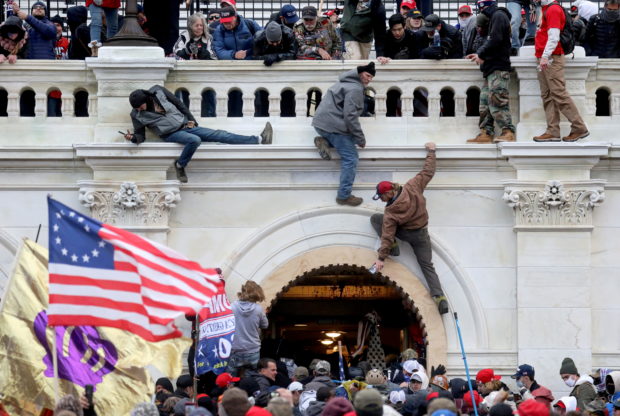
FILE PHOTO: A mob of supporters of U.S. President Donald Trump fight with members of law enforcement at a door they broke open as they storm the U.S. Capitol Building in Washington, U.S., January 6, 2021. REUTERS/Leah Millis/File Photo
WASHINGTON — A U.S. appeals court on Thursday put off allowing congressional investigators access to former President Donald Trump’s White House records relating to the Jan. 6 attack on the U.S. Capitol and scheduled a hearing on the matter for Nov. 30.
Trump’s lawyers had asked the U.S. Court of Appeals for the District of Columbia Circuit to put Tuesday’s lower court ruling on hold pending an appeal, which they said could be fast-tracked for a quick ruling.
The three judges on the appeals panel randomly assigned to the case were all appointed to the judiciary by either President Joe Biden or former President Barack Obama, both Democrats.
The National Archives, a federal agency that holds Trump’s White House records, had been scheduled to give Congress hundreds of pages of documents on Friday.
U.S. District Judge Tanya Chutkan’s decision on Tuesday allowed the U.S. House of Representatives committee investigating the attack to access telephone records, visitor logs and other White House documents that Trump wants blocked.
The committee has said it needs the requested materials to understand the role Trump may have played in fomenting the riot in which his supporters aimed to block lawmakers from certifying Biden’s presidential win.
The Republican former president had argued that the materials requested by the committee were covered by a legal doctrine known as executive privilege that protects the confidentiality of some White House communications.
But Chutkan rejected that argument in a clear win for congressional oversight powers.
Four people died on Jan. 6, one shot dead by police and the other three of natural causes, and more than 100 police officers were injured in the attack. A Capitol Police officer who had been attacked by protesters died the next day, and four other police officers who defended the Capitol later died by suicide.